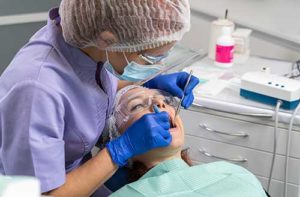The practice of periodontics in dentistry encompasses many diseases of the mouth, teeth, and gums. These periodontal diseases attack the supporting structures of the teeth, such as the gums and jawbone.
Proper dental care and at-home oral hygiene can help prevent these problems. Some of the most common diseases include gingivitis and periodontitis. Your periodontist at Lovett Dental Conroe can help you recognize the signs of gum disease and build an at-home hygiene plan that helps you better care for your teeth.
How Do You Know You’re Developing Periodontal Disease?
 Your dentist checks your gums each time you visit. They also typically perform a teeth cleaning to remove plaque buildup, which can cause problems. You should make an appointment with your dentist if you notice any of the following signs that indicate you’re developing a condition that requires immediate periodontal treatment or dental services.
Your dentist checks your gums each time you visit. They also typically perform a teeth cleaning to remove plaque buildup, which can cause problems. You should make an appointment with your dentist if you notice any of the following signs that indicate you’re developing a condition that requires immediate periodontal treatment or dental services.
- Chronic bad breath: Shortly after a breath mint, brushing your teeth, or using mouthwash, you notice you still have bad breath. In 85 percent of the individuals with chronic bad breath, the symptom indicated a dental condition such as cavities, gum disease, dry mouth, tongue bacteria, or oral cancer.
- Developing cavities: Plaque combined with sugars and starches from the food you consume forms of acids that erode your tooth enamel. When you brush and floss, examine your teeth for cavities forming.
- Red gums: Healthy gums have light pink color to them. Darker pink and red gums indicate a problem.
- Swollen gums: Swelling in one area of the gums or throughout the gumline indicates a problem. It may cause you pain to touch your gums, chew, or floss.
- Bleeding gums: If your gums regularly bleed when you brush or floss, this indicates a problem. If you just began flossing and your gums bleed the first day or two, you floss, you can consider that normal. So long as that stops occurring after a few days of flossing, your gums were acclimating to flossing.
- Sores or lumps: If you notice sores or lumps inside your mouth or rough areas inside your mouth, this could signal oral cancer. Sores that last more than two weeks can indicate a serious problem.
- Bite changes: Changes in your bite or jaw can also indicate oral cancer. Difficulty chewing or moving your jaw or tongue also fall into this category.
- Tooth erosion: This refers to the wearing down of teeth as well as cracks developing in teeth.
- Sensitive teeth: When you eat or drink something hot, cold, or sweet, and it causes pain, check your teeth for cavities first. If you do not spot any cavities, it could indicate a gum issue. If your teeth or jaw hurts in cold weather, this also falls under the sensitive teeth category.
Going to the Dentist for Periodontal Treatment
Early treatment from a dentist specializing in periodontics can help the problem. Your dentist will review your medical history and examination to determine the cause of the pain or inflammation. This includes asking questions about what you eat, whether you smoke, and what medications you take regularly. Some prescription drugs cause dry mouth or create gum sensitivity.
Your exam will usually include dental X-rays to check for bone loss as well as measurements of your pocket depth. That refers to the depth of the groove between your tooth and your gum line. A healthy mouth has a pocket depth of one to three millimeters, while a greater pocket depth of four millimeters or more indicates an issue.
How Dentists Treat Periodontal Disease
Your periodontist chooses your treatment for periodontal disease based upon your gum or mouth disease. Pulling a cavity might solve the problem, as might filling one. You might need antibiotics to treat a bacterial infection or scaling, root planing. Some advanced issues require oral surgery. Your treatment depends on the dental issue, your medical history, existing medications you use, and other factors.
Make Your Periodontics Appointment Today
Contact Lovett Dental Conroe today via email or 936-760-2400 for periodontal treatment. Make your appointment today to improve your dental health.
